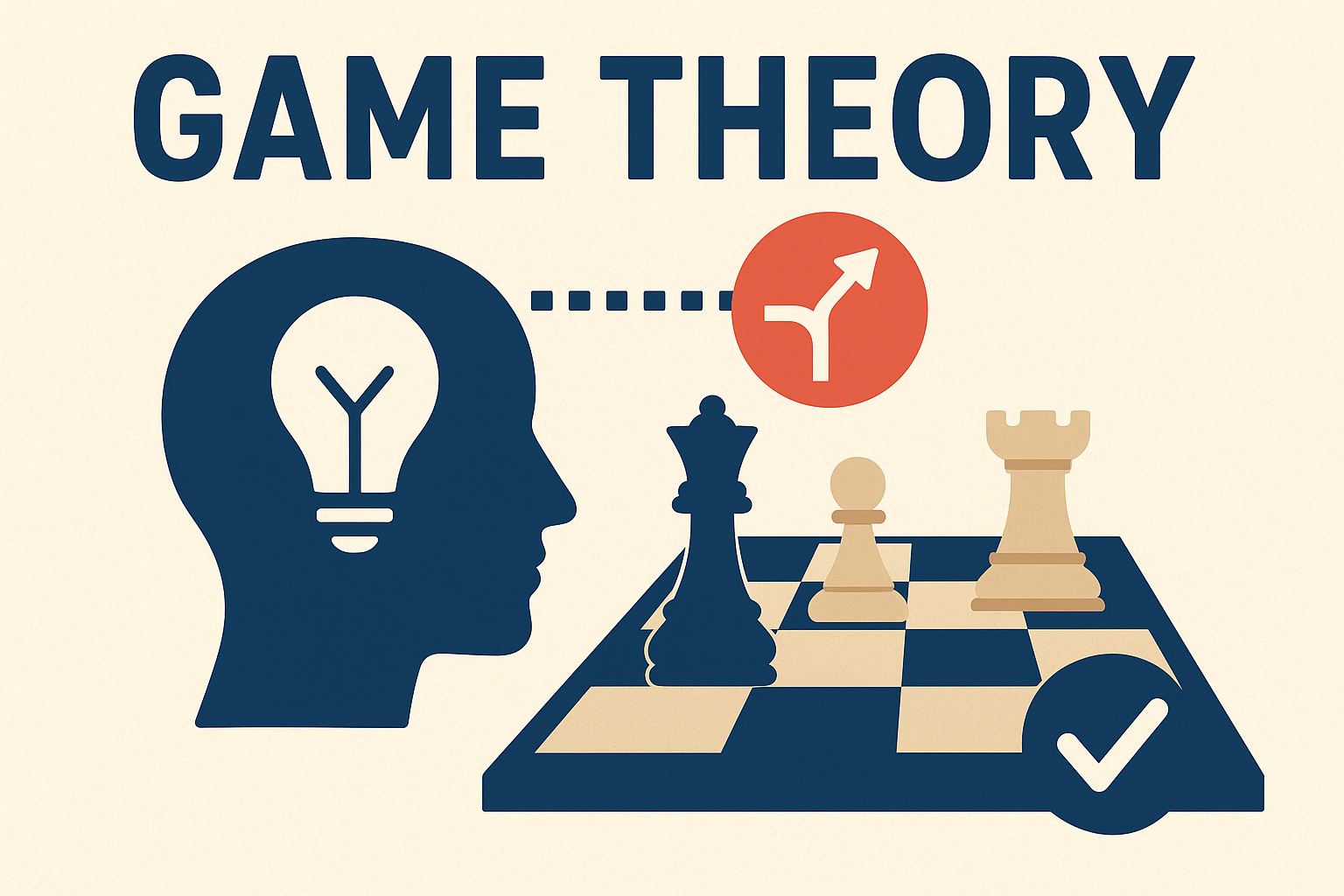Game Theory has become one of the most fascinating and widely applicable theories in modern economics, political science, management, psychology, and even everyday decision-making. Whether it’s countries negotiating peace treaties, companies setting their product prices, or individuals deciding on personal strategies, Game Theory provides a scientific framework to predict choices and outcomes in situations of competition and cooperation.
Thank you for reading this post, don’t forget to subscribe!What is Game Theory?
Game Theory is a mathematical framework for analysing situations of conflict, cooperation, or competition between rational decision-makers. It studies how individuals or groups (called players) make strategic choices when the outcome depends not only on their decisions but also on the decisions of others.
In simple words: Game Theory is about predicting the behaviour of people (or organizations) when they interact and their choices affect each other.
Who is the Propounder of Game Theory?
The foundation of modern Game Theory was laid by John von Neumann and Oskar Morgenstern in their 1944 book “Theory of Games and Economic Behaviour”.
Later, John Nash (Nobel Prize winner, 1994) revolutionized the theory by introducing the concept of Nash Equilibrium, which became central in understanding decision-making in economics, politics, and business.
Key Concepts of Game Theory
- Players – Individuals, groups, companies, or countries involved in the game.
- Strategies – Plans of action available to players.
- Payoffs – Rewards or outcomes players receive based on choices.
- Equilibrium – A situation where no player has an incentive to change their strategy unilaterally.
- Zero-Sum Game – One’s gain is exactly another’s loss.
- Non-Zero-Sum Game – All players can gain or lose together (win-win or lose-lose).
- Cooperative vs. Non-Cooperative Games – Whether players work together or act individually.
Importance and Relevance of Game Theory
1. Economics and Business
- Helps firms set pricing strategies (e.g., price wars between competitors).
- Guides businesses in market entry, advertising, and mergers.
- Explains bargaining and negotiation in labour markets.
2. Politics and International Relations
- Used in voting systems, coalition-building, and political campaigns.
- Countries apply it in arms races, trade agreements, and diplomacy.
- Famous example: Cold War nuclear deterrence (“Prisoner’s Dilemma” in real life).
3. Military and Strategy
- Used in war-game simulations to predict enemy moves.
- Helps in defence planning and conflict resolution.
4. Biology and Evolution
- Explains survival strategies in animals (Evolutionary Game Theory).
- Example: Why some animals fight and others cooperate for survival.
5. Psychology and Sociology
- Studies human behaviour in trust, competition, and cooperation.
- Helps understand decision-making in groups and social dilemmas.
6. Everyday Life
- Deciding whether to cooperate or compete in personal and professional situations.
- Example: Two friends deciding whether to share resources or compete for them.
Classic Examples of Game Theory
- Prisoner’s Dilemma – Two criminals must decide whether to betray each other or stay silent. The best outcome is cooperation, but fear leads to betrayal.
- The Chicken Game – Two drivers speeding towards each other; the one who swerves first is seen as “weak,” but if neither swerves, both crash.
- Nash Equilibrium – A state where no player gains by changing their decision if others keep their strategies unchanged.
Modern Applications of Game Theory
- Online Platforms – Algorithms for auctions (e.g., Google Ads, eBay).
- Cybersecurity – Predicting and preventing hacker strategies.
- Climate Change Negotiations – Countries deciding how much to reduce emissions.
- Healthcare – Strategies for vaccination policies, organ donation, and medical resource distribution.
- Artificial Intelligence – Machine learning models often apply game-theoretic concepts.
Why is Game Theory Still Relevant Today?
In today’s interconnected and competitive world, Game Theory is not just an abstract mathematical tool but a practical guide:
- In business, it helps companies outthink competitors.
- In politics, it helps leaders anticipate rivals’ moves.
- In daily life, it makes people smarter decision-makers.
With globalization, digital platforms, AI, and strategic competition in every field, Game Theory remains more important than ever.
Conclusion
Game Theory is the science of strategic decision-making. From its origin with John von Neumann, Oskar Morgenstern, and John Nash, it has transformed economics, politics, business, biology, and even human psychology.
Whether you’re a policymaker, entrepreneur, student, or just curious about smart decision-making, understanding Game Theory equips you with a powerful lens to analyse choices, anticipate outcomes, and succeed in a competitive environment.

Leave a Reply